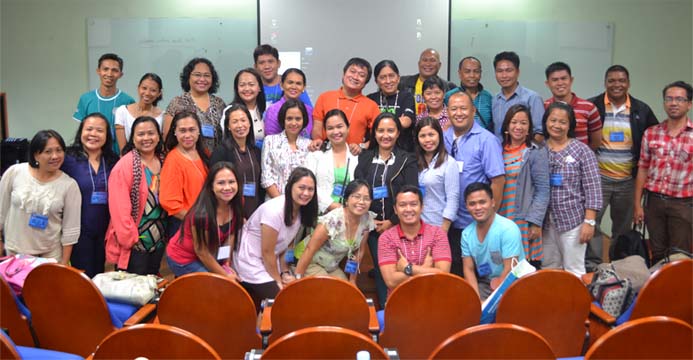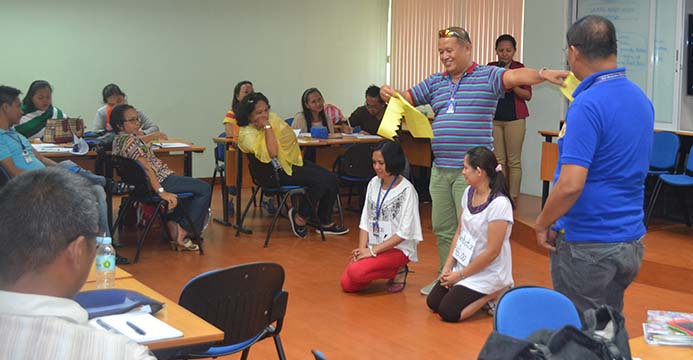Philippine Cultural Education Program
With the promulgation on August 11, 2001 of Republic Act 9155, also known as “An Act Instituting a Framework of Governance for Basic Education, Establishing Authority and Accountability, Renaming the Department of Education, Culture and Sports (DECS) as a Department of Education (DepEd) and for other Purposes,” cultural education was effectively reaffirmed as an integral part of basic education but administrative supervision of cultural agencies formerly attached to DECS was transferred to the National Commission for Culture and the Arts (NCCA).

In 2001, cognizant of the need to accelerate the process of integrating culture in the basic education curriculum and mainstreaming it in national development plans, the NCCA Board of Commissioners, in its September 2001 meeting, resolved that a Philippine Cultural Education Plan (PCEP) be formulated and operationalized.
In 2002, after a series of year-long consultative meetings, PCEP was launched as a comprehensive flagship program that outlined goals, policies, and projects on cultural education through the formal, non-formal, and informal systems. A comprehensive five-year plan of action (2003-2007), containing various proposed programs, projects, and policies, was launched to flesh out the necessary steps toward the attainment of PCEP goals.
The NCCA Board constituted a task force in October 2002. From 2003 – 2007, PCEP was put into operation with the Sub-Commission on Cultural Dissemination as oversight and implementing body. It carried out several projects including national consultative meetings, conferences, workshops, training-writeshops, arts camps and festivals on culture-based teaching and good governance.
Among the projects initiated was the Kaguruang Makabayan National Consultative Workshop Series on Culture-Based Teaching of the MAKABAYAN Curriculum. To ensure that the plan is properly reviewed, updated, consolidated, and extended, the NCCA Board of Commissioners created the PCEP Task Force in March 2007.
The enactment of the National Cultural Heritage Act of 2009 on March 26, 2010, PCEP established a major gain by its designation as the body, together with DepEd, tasked to “formulate the cultural heritage education programs both for local and overseas Filipinos to be incorporated into the formal, alternative and informal education, with emphasis on the protection, conservation and preservation of cultural heritage property (Article X, RA 10066)."
Graduate Diploma in Cultural Education
Since the summer of 2008, the NCCA-PCEP, through several conduit-HEIs nationwide, has been offering a credit-earning post-baccalaureate teacher enhancement program called Certificate Program on Cultural Education (CPCE), which is now formally known as the Graduate Diploma in Cultural Education (GDCE).
Strongly aligned with the program objectives of the Philippine Cultural Education Program (PCEP), the 24-unit program offers scholarship opportunities for 40 to 50 region-based public elementary and high school teachers in the core subject areas (Science, Mathematics, Social Studies, English and Filipino) and MAPEH (Music, Arts, Physical Education and Health) to undergo a two-summer intensive training.
Designed as an in-service residential program, the GDCE covers a total of 432 hours of intensive training designed to integrate functional understanding of the local and national history, culture, heritage and the arts into the five core subject areas – Social Sciences, Languages, Science, Math and MAPEH. It requires its participants to produce researches on local history, reflection papers, and group and individual lesson exemplars on culture-based basic education.

Aligned with the PCEP’s thrust in expanding and formalizing cultural education, GDCE has equipped the teachers to have culture-based teaching and learning experiences. Philippine Culture and Arts courses such as Philippine Arts, Revisiting Philippine History, Ethno-Linguistics, and Cultural Mapping, among others, were taught in this graduate diploma program.
The program was aimed at forming teachers to become culturally aware, sensitive and become advocates "who now know better how to impart not only the knowledge but also the responsibilities of promoting, protecting and handing down our culture, values, heritage and traditions to the younger generation."
The students of GDCE have undergone through the modular lectures, excursions, field studies, and artistic performances exposures. At the end of the program, they came up with culture-based lessons and mechanisms, and were expected to apply these to their respective institutions.
The two-summer 24-unit post-baccalaureate program, divided into Level I and Level II, offers the foundation and major courses to enhance the participants’ understanding of the theories, processes and applications of arts, culture, heritage in the culture-based teaching of the basic education curriculum.
Xavier University, through its Xavier Center for Culture and the Arts (XCCA) and School of Education (SOE), congratulates the 29 scholars who successfully completed the Level I of the Graduate Diploma in Cultural Education:
Ang, Riza A (Corrales Elementary School)
Apduhan, Gil T (Tagoloan National High School)
Balayo, Ernie Regie C (Lapasan National High School)
Balisado, Amadia N (Bangud National High School)
Cane, Apbilla B (Calamba National Comprehensive High School)
Carlos, Roy Guinawat (Manolo Fortich National High School)
Cirunay, Mary Ann B (Gingoog City National High School)
Curay, Genevie E (Kapatagan National High School)
Dahan, Joje M (Misamis Oriental General Comprehensive High School)
Dela Torre, Jorie J (Lapasan National High School)
Doliente, Roslyn M (Magallanes National High School)
Doño, Mark Windel R (Dagumbaan Elementary School)
Elago, Edgar T (Doña Rosario National High School)
Fudolig, Gerlie May G (Looc National High School)
Galo, Marie Jane T (Gingoog City National High School)
Galono, Mary Caress T (Lapasan National High School)
Go, Joramer E (Valencia National High School)
Idulsa, Annabelle J (Bukidnon National High School)
Labininay, Niño S (Lapasan National High School)
Lagumbay, Elfinda U (Cagayan de Oro National High School)
Layson, Brian (Bukidnon National High School)
Lumagsao, Jeddy C (Taglimao Elementary School)
Maestrado, Jennefer A (Tagoloan National High School)
Ontoy, Ivor I (Kibuda Elementary School)
Pimentel, Arthur G (Valencia National High School)
Suralta, Astrud B (Cagayan de Oro National High School)
Tarre, Nora G (Cagayan de Oro National High School – Balulang Annex)
Villegas, Sunshine R (Cagayan de Oro National High School)
Zamora, Dinah Zoraida B (Lapasan National High School)